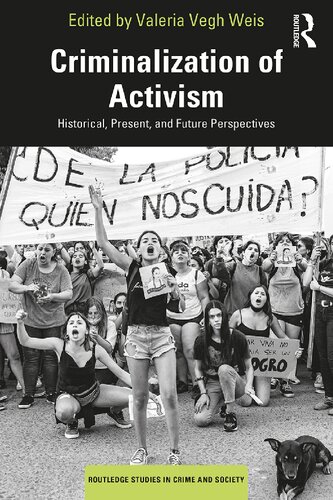

Most ebook files are in PDF format, so you can easily read them using various software such as Foxit Reader or directly on the Google Chrome browser.
Some ebook files are released by publishers in other formats such as .awz, .mobi, .epub, .fb2, etc. You may need to install specific software to read these formats on mobile/PC, such as Calibre.
Please read the tutorial at this link. https://ebooknice.com/page/post?id=faq
We offer FREE conversion to the popular formats you request; however, this may take some time. Therefore, right after payment, please email us, and we will try to provide the service as quickly as possible.
For some exceptional file formats or broken links (if any), please refrain from opening any disputes. Instead, email us first, and we will try to assist within a maximum of 6 hours.
EbookNice Team

Status:
Available0.0
0 reviewsCriminalization of Activism draws on a multiplicity of perspectives and case studies from the Global South and Global North to show how protest has been subject to processes of criminalisation over time.
Contributors are made of up scholars and activist from different disciplinary backgrounds, with a balance between authors from the Global North and the Global South. An introduction frames the topic within critical criminology, while also highlighting the possible disciplinary approaches and definitions of criminalization of resistance/activism. The editors also look into the particularities of the current times in comparison to dynamics of criminalization in prior stages of capitalism.
The first part offers four different theoretical approaches to understand the complex interrelations between politics and criminalization of resistance. Second, the book offers case studies to expose certain historical patterns in the criminalization of riots, experiences of resistance and class struggle. This includes an analysis of the cast system in India, neoliberalism and social inequality in Argentina and refugees in Italy and Greece. The third part of the book deals with three further case studies which expose trends in the historical criminalization of policing and prison related struggles, analysing prison riots in the United States and Argentina, and the civil rights movement confronting police brutality in the United States. Part four provides insight into historical patterns in the criminalization of political activities, with case studies on Italian leftist activism, the Israeli-Palestinian conflict and the Catalonian struggle for independence. The last part of the book deals with the criminalization of green struggles, examining the green ban in Australia, indigenous struggles in Brazil and Ecuador and environmental demonstrations in Belgium. Finally, the conclusion analyses the interactions between the different contributions and discusses the future challenges to this field of study.
Bringing together a range of criminalisation themes into a single volume, compromising historical criminology, indigenous studies, gender studies, critical criminology, southern criminology, convict criminology and green criminology, it will be of great interest to scholars and students of criminology and sociology, as well as those involved in activism.